Monthly Archive for July, 2009
So. Is the glass half full, or half empty?
There are of course other options, and it may well be difficult to tell because you are looking at the glass from a funny angle.
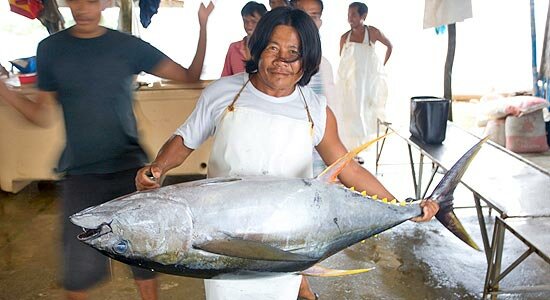
The new report underlines that in large swathes of the worlds' fisheries conservation measures are not happening
That certainly seems to be the conclusion when reading the various media interpretations of an important new study published in the journal Science on the world’s fisheries.
The study’s key co-authors are Professor Boris Worm, and Professor Ray Hilborn – who can be seen verbally dueling over the state of the world’s fisheries in The End Of The Line.
Continue reading ‘Good news for fisheries - if we continue conservation measures’

A few weeks ago we asked you to send us your reviews of The End of the Line, with the promise of prizes and fame.
We said there would be giving away film-related items and that we would publish a selection on the site.
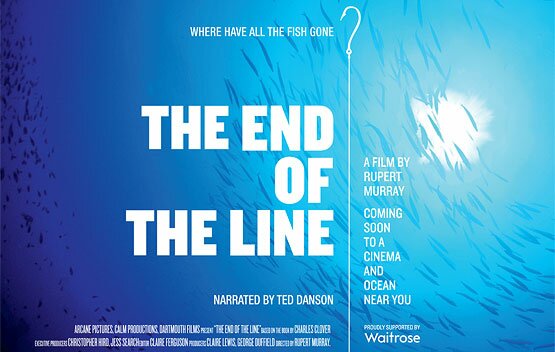
The End of the Line official cinema poster
Well, the prizes have been decided upon. We will be giving away four official cinema posters for The End of the Line, which are not available to buy anywhere. They will also be signed by a senior member of The End of the Line team.
Below are the first two winners - well done to Ruth H Leeney and Cécile Eclache. Your posters will be on their way shortly. Continue reading ‘First winners for The End of the Line reviews competition’

The team here at The End of the Line have been amazed at the response the film and campaign have had from the public, the media and businesses.
From the success of the US and UK screenings to the changes in sourcing policy that film has helped to achieve in UK food chains such as Pret a Manger and Marks and Spencer, we couldn’t have wished for more.
The support and feedback we are getting has also been fantastic, and the worldwide demand for the film has been massive.
We do intend to bring the film to many countries later this year, including (but not limited to) the rest of Europe, Australia/New Zealand, Africa, South America and Asia.
If you want to see the film, email us at and we will let you know when there is news about arrangements for your country. We will reply to all the comments and suggestions - but it might take us a bit of time.
You can also check the Screenings page of the website for the latest information.
There will also be a DVD release of the film worldwide after the cinema screenings, dates will be confirmed later in the year.

For those of you keen to see the film in New York, a very special screening of The End of the Line has been arranged that will take place on Saturday 22nd August on the beach at Governors Island.
Rooftop Films and The Fledgling Fund are in the process of finalising arrangements, which look set to include live music from Sound Fix Records, and a large tent should rain attempt to spoil the evening. Attendees will have to get a ferry across from the southern tip of Manhattan.
For more information and to book tickets see the Rooftop films website. For details of other forthcoming showings see the US screenings page. Continue reading ‘Special screening of The End of the Line in New York’

Slightly later than usual, here is the latest coverage and reviews relating to The End of the Line film and our campaign to protect the world’s oceans.
Another busy week has seen more reviews, features and support from media in the US, Canada and Britain.
First mention must go to the review of The End of the Line by respected film critic Roger Ebert, in the Chicago Sun Times.
He gave the film 3/4 stars, saying: “The End of the Line, directed by Rupert Murray, based on a book by Charles Clover, is constructed from interviews with many experts, a good deal of historical footage, and much incredible footage from under the sea, including breathtaking vistas of sea preserves.” Continue reading ‘The End of the Line reviews and coverage’

Earlier this week we reported on the row between Lord Antony Rufus-Issacs and Sir David Tang, owner of China Tang at The Dorchester Hotel, over the sale of shark fin soup by the restaurant.
The End of the Line started a campaign to ask China Tang not to serve shark fin soup, which proved to be short-lived as Sir David agreed not to serve the soup at the London restaurant following pressure from environment groups.
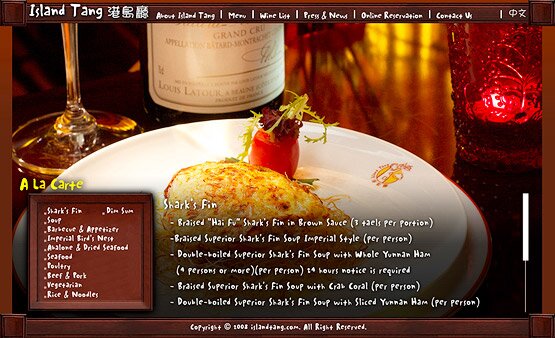
Screenshot of the Island Tang website showing shark fin soup
However, Sir David has come under renewed attack after it became clear that shark fin soup remains on the menu of Island Tang, the Hong Kong restaurant that he also runs. Continue reading ‘The End of the Line renews call to Sir David Tang to end sale of shark fin soup’

To all you fellow ocean lovers, I know these screen shots will be an uncomfortable sight for you. They show the shark fin section of the menu for Island Tang restaurant in Hong Kong.

Screenshot of the Island Tang website showing shark fin soup
To me the thought of eating shark fin is about as appealing as eating a cheetah’s tail. Braised shark fin anyone?
There is not a chance in hell I would ever touch the stuff!

Second screenshot of the Island Tang website showing the other shark fin dishes
Why am I so passionate about sharks? This time last year I was living on a remote island around 14 hours boat ride off of mainland Fiji where I was helping on a marine conservation project.
I was lucky enough to dive at Shark Alley which has been described by Harper’s Bazaar magazine as ‘One of the worlds most enviable dive site’. I very much agree.
After doing our safely checks we dropped down into the sea and straight away as I was slowly lowering to deeper depths I could see 10 sharks. This became around 30 whitetip and blacktip reef sharks. I had only briefly dived with one shark before this, so I was a little nervous. Continue reading ‘Why sharks belong in the sea, not in soup’

As per the great British tradition, there was something fishy in yesterday’s news: an interesting little snippet in PR Weekly, announcing that a new PR firm has been hired to work for Seafish.
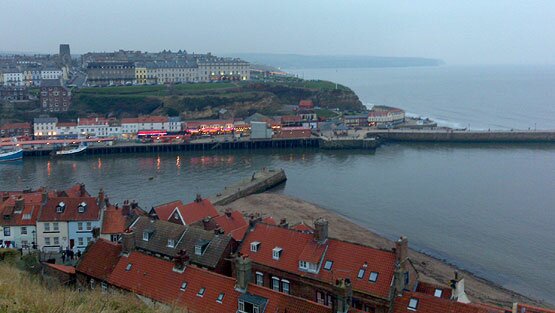
Whitby seafront: Up until the 1950s bluefin tuna was caught off the East coast of the British Isles
Seafish, in case you didn’t know, are the industry body responsible for promoting (and, in many cases, defending) the fishing industry in the UK. They are paid for by us, both as a levy on the fish we buy, and in government funding.
The news here is that they are looking to communicate how the UK fishing industry is 100 per cent behind ’sustainability’, which is of course fantastic.
Not least because UK seas, like many others in Europe, have seen the most rapacious excesses of overfishing in decades and centuries gone by.
They also say that one of the issues they want to communicate is “the sale of bluefin tuna”.
Now, Seafish are rather late to that particular party for a number of reasons. Our own fisheries minister has already announced that the UK will back a ban on the trading of bluefin (as have Monaco, France and the Netherlands).
And of course Greenpeace, The End of The Line, WWF, Oceana, and many other organisations have been campaigning to change the perilous situation of bluefin for years.
But, of course, we welcome Seafish, belatedly, to the bandwagon. So what does this mean?
Will Seafish be supporting the ban on the trade of bluefin?
Will they be calling for a ban on the sale of endangered species like bluefin by restaurants like Nobu, as our fisheries minister has now done?
Just what will Seafish be doing to make sure bluefin tuna is rescued from the brink of extinction?
I’m certainly keen to find out.
Of course, some in the fishing industry have criticised The End Of The Line for focusing on bluefin, saying it’s not relevant to the UK. But that is where they are very, very wrong.
Not only is bluefin a species on the brink of extinction, something that should concern us all, but it is found in UK waters. That’s why the UK government’s announcement is meaningful.
Not only is the UK a ‘range state‘ for bluefin tuna, but we used to have our own bluefin tuna fishery in the North Sea. Up until the middle of last century, sports fishermen were catching bluefin off resorts like Scarborough and Whitby.
So if Seafish and the UK government are serious about the sustainability of our seas and our fish stocks, presumably they want to manage our seas for recovery, so that species that are no longer common can recover and thrive again in places like the North Sea.
That means designating large areas off-limits to fishing as marine reserves, both for the overall resilience of the seas, and for protecting specific areas of importance (such as the area around the Balearic Islands in the Mediterranean, which is a breeding ground for bluefin tuna).
Rather than see bluefin tuna as an irrelevance or a convenient media hook, I’m looking forward to seeing Seafish do something meaningful to ensure their continued existence.
- Willie MacKenzie is part of Greenpeace’s Ocean Campaign. This blog post originally appeared on the Greenpeace UK website.


The End of the Line's Chris Gorell-Barnes and Charles Clover outside Number 10
The makers of The End of the Line met with Downing Street officials this morning to outline their campaign, as news of further successes inspired by the film came to light.
Earlier this week The End of the Line launched a campaign to ask China Tang, the restaurant at The Dorchester run by Sir David Tang, not to serve shark fin soup.
We can now report that Sir David has said the restaurant will not be serving the soup.
Conservationist Lord Antony Rufus-Issacs had said that when he ate at China Tang he was offered shark fin soup - which was not on the menu. Having been inspired by The End of the Line, Lord Antony wrote to Sir David to protest.
There followed an angry email exchange between the two which led to a story in Richard Kay’s column in the Daily Mail and the launch of our short-lived, but successful, campaign.
The other piece of good news this week was for bluefin tuna, following the Netherlands’ announcement yesterday that it was backing proposals by Monaco to add the Atlantic bluefin to Appendix I of the Convention on International Trade in Endangered Species of Wild Fauna and Flora (CITES).
This came after France and Britain supported the global trade ban on the fish, late last week.
More news on the outcome of The End of the Line’s visit to Downing Street will follow in the coming days and weeks.
- Bluefin tuna update, 23rd July: Germary has announced that it is supporting the addition of Atlantic bluefin tuna to Appendix I of CITES

The End of the Line team is always keen to see examples of publicity surrounding the film and our campaign.
So when we saw this series of images, supplied by New American Vision and Flag Marketing, taken on the streets of Los Angeles, we thought it would be good to share them.
See if you can spot the connection - this will be easier for those of you in the US and Canada, or those who have been following the film since it’s premiere at the Sundance Film Festival in January this year. This link will also offer a clue.
If you have seen anything similar - The End of the Line posters or branding - take a photo and send it to us, we’ll put the best ones on the site. Email them to . Continue reading ‘The End of the Line on the steets of Los Angeles’

News of The End of the Line is spreading far and wide.
Dutchmen Jos Wassink and Koos Termorshuizen are currently on a three-month cycling tour around the North Sea.
They stopped off in Dedham, Essex, to see Charles Clover on their way through England and wrote about it on their website Northseacycling. You can read their interview - Inconvenient Truth of fisheries - on the site.

- Following the news that China Tang will not be serving shark fin soup, we have stop collecting names to send to the restaurant. You can read our latest news here.
China Tang, the restaurant located in The Dorchester hotel run by Sir David Tang, has come under fire for allegedly selling shark fin soup.
Conservationist and film maker Lord Antony Rufus-Issacs says that he was offered the soup, which was not on the menu, when he dined at the restaurant last week. He has written to Sir David asking him to stop serving shark fin soup, after seeing The End of the Line.
In his letter, he said: “I have seen the film [The] End on the Line and was deeply effected [sic] by it as were so many people. I am writing to you as a result of seeing the film.”
China Tang has subsequently claimed that this was a ‘mistake’ by staff, and that they took shark fin soup off the menu months ago due to ethical concerns.
Shark fin soup is contentious as the fins are often ‘harvested’ by cutting the fins off live sharks that are then thrown back into the sea to bleed to death.
Shark fin soup is traditionally eaten on special occasions, such as weddings, in Chinese society. It is regarded as a status symbol due to the cost of the fins and has to be flavoured with stock as the fins themselves have little or no taste.
The End of the Line campaign abhors the practice of shark-finning and calls on China Tang to not serve the soup. We have compiled an email to send to China Tang, expressing your concern and asking them not to sell it.
You can view our protest over shark fin soup here.

All of this week’s coverage of The End of the Line comes from the United States and Canada - apart from one mention in The London Standard.
Charles Clover is interviewed about the film by Katherine Monk in Canada’s National Post. He tells her: “You people in Canada have already seen what happens to communities and the ecosystem when you fish out a given species.
“The reality of overfishing became obvious with the collapse of the northern cod stocks in Newfoundland. The Department of Fisheries and Oceans screwed up.
“They thought their job was taking care of the fishery, and not the fish. You have to take care of the fish first, because without the fish to catch, there is nothing for the people - and this was a bit of a revelation.” Continue reading ‘Canadian media dominates this week’s coverage of The End of the Line’

Despite the old adage, it seems that crime does pay… at least if you are the Stevenson family of Newlyn.
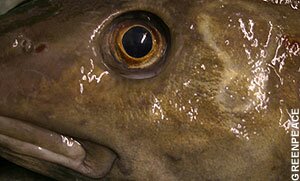
Cod - The Stevenson family were fined £1 for each of the 45 charges that they were found guilty of
As reported by the BBC, the family, who operate fishing trawlers in Cornwall, were prosecuted for routinely landing illegal fish.
Not only were they landing species they had no quotas for, but they were doing so by passing them off as other species, so it was all pre-meditated and well-orchestrated.
They also conveniently ran the auctions where the fish are sold, and falsified the records of what fish had been sold to match what the skippers said they landed.
And it was also profitable - it’s estimated that £4m worth of fish were landed illegally. All the more galling that the firm is run by Elizabeth Stevenson, who was the former president of the National Federation of Fisheries Organisations.
But we can take solace in the fact that they were caught and prosecuted. They were found guilty of a total of 45 charges. And they have been fined accordingly… or so the judge seems to think.
On top of paying legal costs (£66,000) and being ordered to pay back £710,000, they have just been fined for the offences. But the total fine of the actual fine was £45. Yes, £45, I didn’t misplace the decimal point or under-report anything. One measly pound for every charge for which they were found guilty.
Just to set that in context: they profited by over £4 million… and are being punished by getting to keep over £3.2 million.
Whilst some may shrug their shoulders and say, “Well, it’s all Europe’s fault,” they knew what they were doing, and they were trying to get around the system - the system that is of course there because of concerns over dwindling fish stocks and over-fishing.
Had they been trying to use their (clearly) considerable influence to make a point about a problem with discards, I would applaud them. Had they been making a point about destructive fishing methods like beam-trawling being unacceptable (and they would know all about beam-trawlers), then I would have sympathy.
But the truth is, it was all about making money, and to hell with the environmental considerations. These are the real pirates of Penzance but there is nothing romantic about it.
This makes me very angry, and you should be too. They are over-fishing stocks that belong to all of us. This is your money. These are your fish.
There is also a huge amount of irony in Elizabeth Stevenson’s response that, “It’s not going to be easy to find this sum of money. It’s huge.”
- Willie MacKenzie is part of Greenpeace’s Ocean Campaign. This blog post originally appeared on the Greenpeace UK website.

President Sarkozy of France has announced his country’s support for a ban on international trade in endangered bluefin tuna before it disappears forever from the sea and our plates.
His initiative was followed quickly by a similar announcement by Huw Irranca-Davies, the British fisheries minister.
The backing of two major EU countries for a ban on the international bluefin tuna trade has instantly given weight and momentum to the campaign by Monaco - and our film, The End of the Line - to have the bluefin listed under the Convention on International Trade in Endangered Species of Wild Fauna and Flora (CITES) next year.
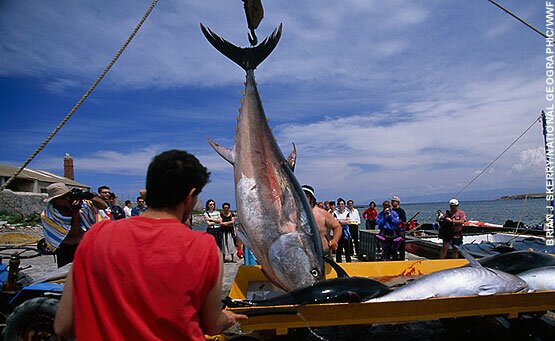
Fishermen haul in a catch of Northern bluefin tuna (Thunnus thynnus) caught with the traditional 'Mattanza' fishing method, Mediterranean Sea
The United States will now be under pressure to respond. Speaking at the close of a national stakeholder consultation on France’s future sustainable fisheries and maritime policy, President Sarkozy said: “France supports listing bluefin tuna on the CITES convention to ban international trade.”
He added: “Ours is the last generation with the ability to take action before it’s too late – we must protect marine resources now, in order to fish better in future. We owe this to fishermen, and we owe it to future generations.” Continue reading ‘Sarkozy takes the lead on saving the bluefin tuna’


![]()









